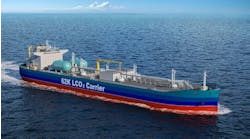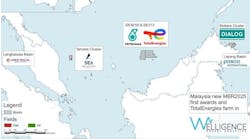Russia’s unique geographical position, the size of its explored reserves of primary energy resources, its developed industrial infrastructure, and the high technological level of its fuel and energy sector provide objective prerequisites for continued strengthening of our role as a leading global energy player. Russia has year after year been increasing its oil and gas output and exports to the world market.
Yet our hydrocarbon exports are almost exclusively westbound at present: the European Union accounts for about 85% of the oil and gas we export, even though the European sector isn’t the most attractive, as energy consumption grows slowly and competition is tougher here than in East Asia. All this prompts our heightened attention to expanding the possibilities for export of energy resources to the Asia-Pacific Region - of course, with full respect of our commitments to consumers in Europe and elsewhere.
We are very pleased to see Sakhalin oil already being supplied to foreign markets, and the range of future consumers of Russian liquefied natural gas (LNG) from Sakhalin will include Japan, the Republic of Korea, China, the United States, Mexico, and other countries.
We hope that launching the Sakhalin projects on a full scale will contribute substantially to maintaining stability in the region, because, like any economic interdependence, this kind of ties in the energy field serve as an important factor of the concentration of international relations and, I would say, minds on creative purposes, on the necessity of mutual consideration for interests and so a search for compromises. In a word, multilateral diplomacy and diplomacy in general will only benefit from this.
Complaints have become more frequent of late over Russian specialized agencies’ examinations of the effectiveness of the implementation of the PSA projects and more stringent monitoring of the resource use and environmental regimes in the extraction of hydrocarbons. We would like to stress that this is due to legislation requirements as well as the specific provisions of the production sharing agreements, envisaging among other things examination and approval by empowered Russian agencies of the capital expenditures of the oil companies developing the fields on PSA terms.
At this stage of Russia’s development, our society presents ever higher requirements for environmental protection in the course of economic activities. The construction route of the Eastern Siberia-Pacific Ocean Trunk Oil Pipeline has only recently been changed for these reasons.
There are no grounds for claims of a PSA revision, and even less so, that foreigners are being forced out of the fuel and energy sector. The share of their participation in the Russian oil and gas extractive industry, as well as the return on capital invested by them keep steadily growing. The latter is most strikingly confirmed by the multibillion profits of BP company in Russia in 2004-2005. So that there is no question of the underlying principle of mutually beneficial cooperation being undermined. Neither let us forget that access to our resource base greatly increases the capitalization of the foreign oil companies. The current examinations do not at all mean that the Sakhalin 2 license will be revoked. Their aim is to ensure the conscientious fulfillment of the terms and conditions of the agreements by all the parties concerned.
Of late, the Foreign Ministry of Russia has noticeably intensified engagement with Russian business circles. In accordance with the cooperation agreements, information and organizational support is being regularly provided for the Russian Union of Industrialists and Entrepreneurs, the Chamber of Commerce and Industry, and the Union of Russian Oil Industrialists. Measures are being taken to ensure that Russia’s participation in leading international and regional organizations is used more effectively to uphold the interests of domestic business. Assistance to the corporate sector of the country is becoming an important thrust in our foreign policy work. In this respect Russian diplomacy is increasingly like that of our major partners. We are inventing nothing new, but, rather, overtaking others in this regard.
We continue building up the Ministry’s engagement with leading domestic fuel-and-energy companies. A cooperation agreement has been signed with RAO UES Russia; agreements are under preparation with OAO Gazprom and OAO Lukoil. With the participation of major energy companies, the Ministry is holding conferences on global energy security and on topical problems in international activities of the Russian fuel and energy sector.
Sergey Lavrov
Russian Minister of Foreign Affairs
10th International Sakhalin Oil and Gas Conference
Yuzhno-Sakhalinsk, Sept. 27, 2006
This page reflects viewpoints on the political, economic, cultural, technological, and environmental issues that shape the future of the petroleum industry. Offshore Magazine invites you to share your thoughts. Email your Beyond the Horizon manuscript to Eldon Ball at[email protected].


